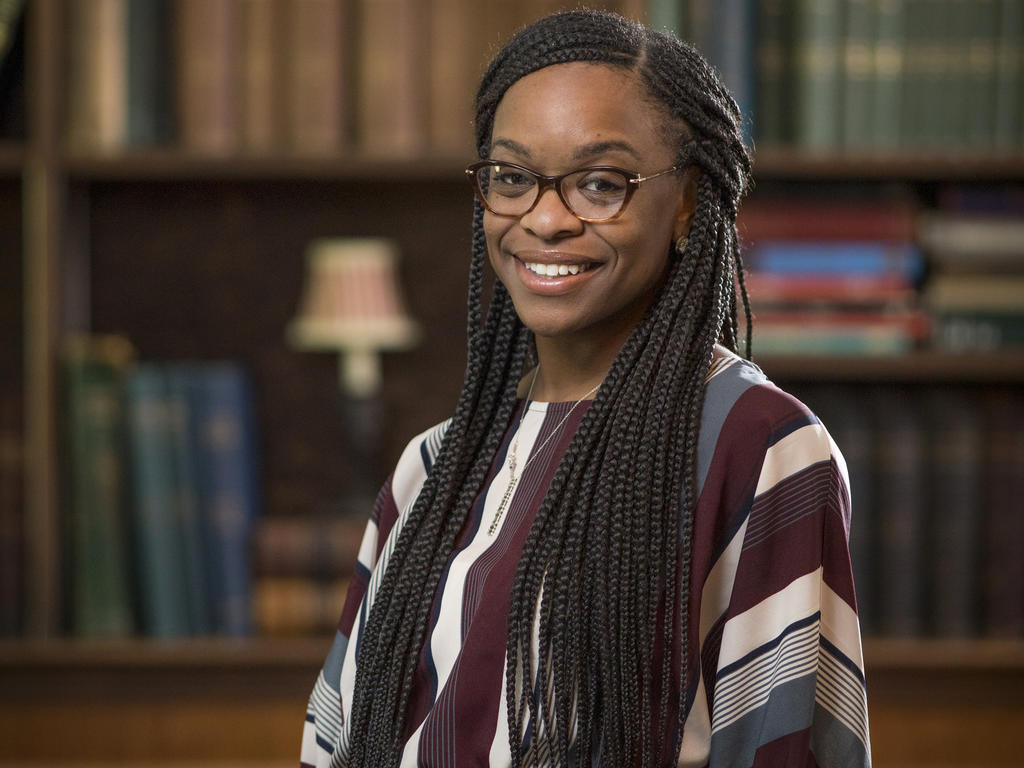Najah Braswell’s fourth-grade class has covered some key concepts this fall, including the order of the food chain, the process of photosynthesis, and the etymology of “water.” But for Braswell ’20, that's only the beginning. She wants her students to know they can learn and can do anything, regardless of the challenges life presents them. "If they have a teacher that’s able to explain what they already inherently understand, then the world is theirs.” In her effort to be that kind of educator, Braswell began the Master of Arts in Urban Education Program in the new non-licensure track this past summer. Today, Braswell is a full-time teacher in the Shelby County Schools system and a student at Rhodes, splitting her days between teaching elementary school and graduate lectures. She's quick, she's motivated, and ready to promote equity in education on a broad scale. Her pedagogy is simple: “I want everyone to feel important. I want to advocate for my students.”
After graduating from Ohio University with a degree in dance, Braswell wanted to enter the classroom as a teacher. The national education nonprofit Teach for America accepted her, and she began her training the summer after graduation. Braswell’s first teaching job was in Helena, Arkansas, a modest town of 10,000. Reminiscing about her first day in Helena, Braswell says, “I entered town through the back roads. I later told my colleagues to not have anyone else enter Helena that way. All I saw was cotton field, cotton field, house, cotton field, three houses, another cotton field—and before you know it, you’re downtown!” Despite her initial perception, she fell in love with her new home, and, between teaching and coaching the school’s dance team, gradually integrated into her new community.
Braswell’s initial years teaching, while difficult, defined her as an educator. For her, it’s all about how opportunity is extended or denied in America. “Opportunity is why I have to be in a classroom. I need my students to know that they deserve a seat at the table, and, when someone’s not extending to you an opportunity, you need to be prepared to take it.”
For her students to secure a seat at the table, Braswell believes they should understand the systems of oppression that have historically denied opportunities to underrepresented minorities in the U.S. "It’s how the universe has evolved from slavery to the present. There are systems, institutions, and ideologies students must compete with. I think it’s important that they are aware of these things and that they have culturally relevant educators who are teaching them about these dynamics, so they aren’t left to wonder, ‘How did I get here?’"
In her classroom, Braswell tackles uncomfortable questions about race and class daily, which is a stark contrast to the experience she had during elementary school. Her students in Helena were fortunate to have these meaningful conversations with her, but as she facilitated these discussions she became aware of her own need for continued education and professional development.
“I knew I wanted to grow as a teacher,” she explains about leaving Helena for Memphis, “but I didn’t know what I wanted to do.” With a strong desire to cultivate educational justice in the classroom, Braswell began exploring her options and found that she connected with the mission of the Master of Arts in Urban Education program at Rhodes. With the introduction of the program’s new non-licensure track, she found the perfect option for graduate study. Braswell’s interactions with Shelby County Schools, both as a teacher and as a student in the master’s program, has helped her think critically about her own teaching practices and how she plans to advance equity and justice in and outside of the classroom. Braswell’s involvement in the program continues to shape her desire to address systemic racism in public education. Whether she’s in front of a classroom as a teacher or furthering her research interests as a graduate student, Braswell is committed to exploring how she can combine theory and best practices to enhance her ability to better serve students.
by Zara Raezer '22
